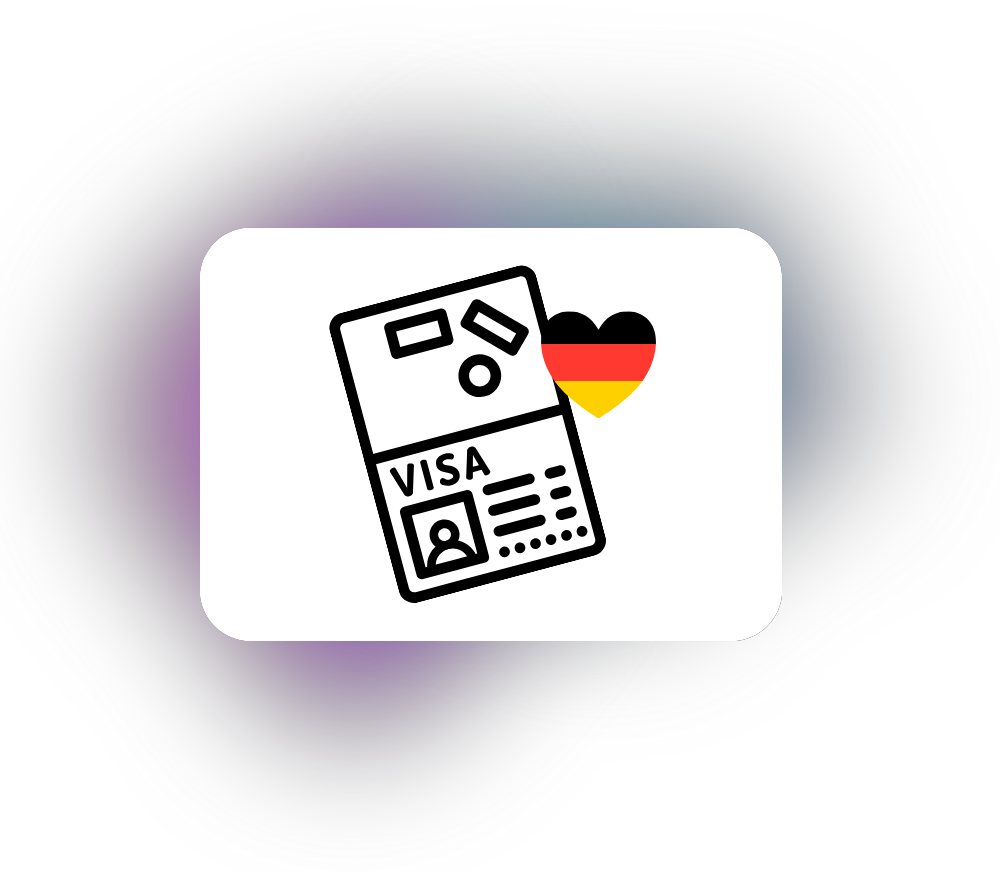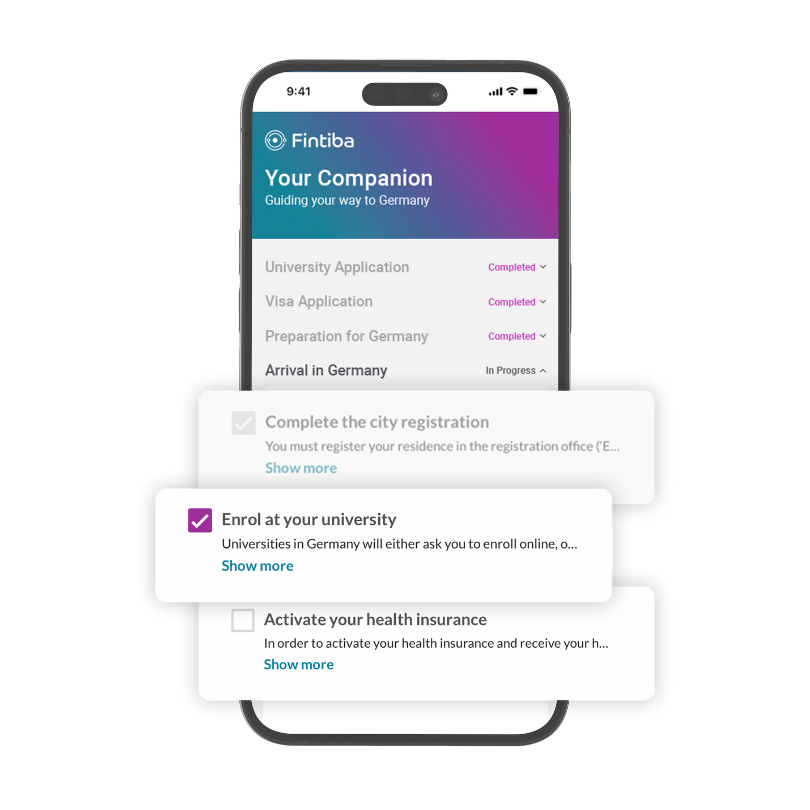One of the most important steps for non-EU-citizens when relocating to Germany is the visa application process. This is a big part of your journey, which requires your special attention. The following article describes everything on the topic of visa and residence permit. Furthermore, it will answer your questions about which type of visa you need, what kind of documents you must prepare, how the application process works and how long it takes for your documents to be issued.
Who needs a visa for Germany?
In general, all citizens from outside the European Union or the European Economic Area require a visa for stays of more than three months in Germany. However, some countries do not require a visa to enter Germany if the visitor does not plan to stay for more than 90 days within a period of 180 days. Nationals from these countries can also enter without a visa but must apply for a residence permit (Aufenthaltserlaubnis) if they intend to stay for more than 3 months. These countries include, for example, Australia, Canada, Israel, Japan, South Korea, New Zealand, and the United States.
You can find an overview of the visa requirements for your country on the page of the German Federal Foreign Office.
Costs for a German visa
The fee for short-stay and Schengen visas is € 80.00 which needs to be paid upon submission of the application. The fee for long-stay national visas for over three months is € 75.00. In certain cases, you can also get fee reduction or waivers on your application. It is worth to mention that the fee can usually be paid to the German mission abroad in your local currency. Please note that if your visa application is rejected this fee cannot be reimbursed.
Visa processing time
After submitting all documents to the embassy, you will need to wait for your visa. The processing period usually takes up to 4 weeks. However, sometimes it can take longer, as each case is very individual and different circumstances may apply. For example, your application will always be shared with the local foreign office of the city where you plan to stay, which must first approve the application. In general, you must take this processing time into account and plan your visa application in advance. It is therefore advisable to start the process about 4-5 months before your planned arrival date in Germany.

Need guidance on your way to Germany?
Say goodbye to feeling overwhelmed while planning your journey to Germany! Our free comprehensive checklist provides you with an overview of your to-dos at all stages of your German adventure. From your visa application to settling in Germany – we’ve got you covered!
Register for the Fintiba Companion for a smooth and seamless relocation process!
German visa types
In case you are a citizen from a non-EU or non-EEA country, and you know that you need a visa, the next step would be to find out which type of visa is the most suitable for your stay in Germany.
You can apply for many types of visa, depending on your objective of entering Germany. What you need for this and what other documents you may require changes depending on your personal situation.
Student Visa
If you plan to study in Germany and have received your admission letter from an educational institution, you need to apply for a visa for study purposes. To be eligible to enter Germany for study purposes you must provide proof of a recognised school leaving certificate (for undergraduate degrees), degree or diploma from an educational institution. Besides that, a confirmation of your ability to cover your living costs for the duration of your studies, ideally in the form of a blocked account, as well as proof of sufficient health insurance coverage is required. Depending on whether your studies are conducted entirely in German or English, you must also provide proof of your German language skills.
Student visas are usually valid for three months. After arriving in Germany, you will need to go to the foreigners’ authority at your study location to convert your student visa into a residence permit for study purposes.
Note: It is important that you apply for the correct visa! You should not apply for a tourist or language course visa. They cannot be converted into a student visa and you will therefore be forced to leave the country at some point of your stay to apply for the correct visa at home.
Find out more detailed information about the requirements and the application process on our Student Visa page.
How To Get Your German Student Visa Application Done — Quickly and Stress-Free
The application process for the German student visa can be very cumbersome and many aspiring students are often concerned that their efforts may be in vain without external suport from an expert.
With this course, you receive a step-by-step guide through the entire student visa application process, helping you feel secure and at ease even while attending your visa interview
Student Applicant Visa
The Student Applicant Visa is meant for people who want to come to Germany with the intention of searching for a university or improving their qualifications to be recognised by German universities. Additionally, this type of visa is required in case you need to fulfil certain requirements before your official admission for enrolment such as an entrance examination, an interview, a demonstration of your skills, or different.
This type of visa is usually issued for three-months. If you find that three months is not long enough, you may extend your visa to a maximum of six months. If you are admitted to the university or foundation course within this period, you may apply for a student visa.
Language Student Visa
In case you are planning to take an intensive language course in Germany that lasts between 3 and 12 months and which is not a preparatory measure for enrolling at university, you need to obtain a visa for language acquisition. It is important to note that if you are travelling to Germany for study purposes, you are not a language student and need to apply for a student visa instead. For a language student visa, you would need to prove sufficient funds in a blocked account as well as health insurance for the duration of your stay.
Job Seeker Visa
If you have a certificate of higher education that is recognised by German authorities, you can apply for a Job Seeker Visa, which allows you to stay in Germany for up to six months to search for a job. However, if you wish to work in Germany, it is recommendable to do a Migration-Check beforehand to assure that you will be able to successfully apply for a work and residence permit, which are also a prerequisite for working in Germany. Moreover, a visa for job seekers requires additional proof such as vocational or academic training, qualifications which are recognised in Germany or are equivalent to a German degree, German language skills, proof of funds to cover living costs, and health insurance.
Working Visa
The German labour market has a large demand for qualified workers and has a lot to offer for people from all around the globe. In case you have already found a job in Germany from abroad you need a Long Stay Working Visa. However, similar to the job seeker visa, it is recommended to do a Migration-Check to ensure that you can successfully apply for a work and residence permit, which are also a prerequisite for working in Germany. Information about recognition of foreign vocational training can be retrieved here. Nationals from the EU, the EEA, Switzerland, the USA, Australia, Canada, Israel, Japan, New Zealand, and the Republic of Korea can enter Germany without a visa and must then apply for a work permit in Germany.
Visa for Research
It is possible to come to Germany as a researcher or guest scientist to work on a project with a partner institution located in Germany. To obtain this type of visa you need to conclude a hosting agreement or a work contract with a German research institute.
Internship Visa
Do you wish to do an internship in Germany as a non-EU citizen student? If you are also studying abroad (not in Germany) you have to apply for a visa for an Internship. This internship may not be longer than twelve months and the duration may only be extended in exceptional cases.
Self-employment Visa
Those who are planning to start a business or work as a freelancer in Germany need to apply for a visa for self-employment. The visa will only be granted if you can prove an economic interest or regional demand for your product or service. It must also be foreseeable that your company will be profitable, and you must be able to finance the implementation of the business concept with equity capital or by means of a loan commitment.
Au-Pair Visa
If you want to work as an au-pair in a family in Germany, you must apply for an au-pair visa. However, in Germany, you are only allowed to work as an au-pair up to a certain age. When applying for the visa you must not be older than 26 years. Moreover, you need to have basic German language skills (A1) as well as health insurance covering your entire stay.
Family Reunion Visa
In case you are legally residing in Germany and want to bring over your non-German family members from outside of the EU they can apply for a family reunion visa. With this visa, nationals from abroad can stay either temporarily or permanently in Germany and join their family members, spouse, or relatives.
Tourist Visa
If you plan to visit Germany for less than 90 days, to visit family members or friends or to tour the country, you may need a Schengen tourist visa. However, Germany has an agreement with 62 countries that allows nationals of these countries to travel to Germany for up to 90 days without a visa. These countries include the USA, Australia and all EU member states.

Everything you need for your visa in one package
Check out our Fintiba Plus package which includes an individualised bundle of all required health insurances and a digital blocked account. Meeting all visa requirements has never been easier.
How to apply for a visa?
If you want to apply for a German visa, then follow these steps to ensure a smooth process.
1. Check all requirements
Find out whether you need a visa for your stay in Germany and make sure which type of visa you need to apply for. Then find out about the individual requirements for your specific visa and make sure that you fulfil them.
2. Schedule an appointment at the German Embassy or Consulate
If you meet the requirements for a German visa, you must compile all the necessary documents for your visa application. You can usually find a list of the required documents on the website of the German authority in your home country. Simultaneously, you should already book an appointment at the German Embassy or Consulate. In most cases, this can be done online on the authority’s website. To find the closest German authority in your home country, follow this link. Once you get the appointment confirmation, print it out or save the email for later, because you will need it on the day of the appointment.
3. Apply for a visa in your home country
On the day of your visa application, make sure you are on time or at best arrive 10 minutes earlier. Submit your documents to the application centre so that they can be checked and verified. If they are complete, the documents and your passport will be temporarily stored at the application centre. If you need your passport (e.g. to open a blocked account), please ensure that you keep a digital copy of it. You will then have to sign a printed copy of your application, pay the fee for your visa, and eventually have your biometric data registered. You must keep the final receipt of your visa application as this will be used to collect your visa as soon as it is issued.
4. Arrival in Germany
When preparing for your long-term stay in Germany, you must take all the important papers with you. Important documents are, for example, your birth certificate, graduation certificates, driving licence or marriage certificate (and of course your passport including your visa).
5. Apply for a residence permit in Germany
As your visa is usually only valid for between 3 and 6 months, you must apply for a residence permit in due time. This document will allow you to stay in Germany for a longer time. Find your nearest Foreigners Authority and inform yourself about the individual requirements to obtain a residence permit which corresponds to your visa.
Please note that in many cases you will have to provide verifications of your diploma and certificates, as well as translations and recognitions, which takes time and money. For which documents exactly this is required depends on the visa you apply for and on your home country and can be found out by asking your local German authority directly.

Completing paperwork for your German visa has never been easier!
The Fintiba Visa Tool saves you time, effort and money during your visa application process. Thanks to the pre-verified passport data, the tool will help you minimise errors and increase your chances of getting your visa approved!
The Visa Tool is your application assistant that guides you through the application process and is completely free-of-charge.
Requirements for a German visa
The visa must be requested at a German diplomatic mission before coming to Germany. Which documents you need changes from country to country and can also be asked for at a German diplomatic mission.
The first thing to do when applying for a visa for Germany is to define your visa type and collect the necessary documents accordingly. The visa type depends on the purpose of your planned stay in Germany, such as studying, working, language learning, or job-seeking. All types of visa require special documents, however, there is a general set of documents that needs to be submitted in any case:
- Two duly completed visa application forms
- Valid passport + two copies
- Two recently taken biometric photos
- A birth certificate (for underage)
- Motivational letter (explaining the intention of your stay in Germany)
- A certificate confirming health insurance coverage
- Proof of financial resources, e.g. a blocked account or scholarship
NEW! The fastest way to your blocking confirmation, now even faster!
Open your blocked account with Fintiba and get your blocking confirmation for your German visa instantly after a single credit card payment of the complete blocked amount sum via Fintiba Transfer!
All other documents will serve as supporting documents of your special case. For example, for the working visa application, one needs to submit a contract with the future employer, as well as a professional CV and university degree certificates. For the family reunion visa, the applicant must submit a German language certificate with min. A1 level, the certificate of marriage and all pages of the spouse’s current passport.
Please note that in case you are from China, Vietnam, Mongolia or India, you have to verify your university entrance qualification and university degrees at the Akademische Prüfstelle (APS) of your respective country. The location, opening hours and contact information for that can be retrieved from the website of the German embassy of your country.
Always double-check with your local German embassy if you need to submit additional documents!
See as well
Residence permit for Germany
It is important to know that a visa is only issued for a limited period of time and does not allow a long-term stay. If you intend to stay in Germany for more than just a few months, you must apply for a residence permit after your arrival in Germany. The application procedure is similar to that for the visa you applied for previously. However, you may have to add additional documents related to your status, such as an employment contract, marriage certificate, language course confirmation, etc.
How to apply for a residence permit?
The place where you apply for a residence permit is called the foreigner’s authority (Ausländerbehörde). Find the foreigners authority on your city map and check their website for the next available date. Most foreigner’s authorities have a digital appointment system, so you can make an appointment directly online and start preparing your documents immediately.
Having trouble finding your next Ausländerbehörde? The website of the Federal Office for Migration and Refugees offers a finder for Ausländerbehörden (immigration authorities).
How long is the document processing time?
In most of the cases, the decision whether your residence permit will be granted or extended is made on the same day and then you just have to wait for your residence permit card. However, if some of the documents are missing you may be rejected and must wait for the next appointment. Therefore, please make sure all the documents are prepared correctly.
To sum up, providing all documents duly and showing up in time for your appointments are the cornerstones of getting your residence permit or visa. If you comply with those requirements, it should not be a problem for you to receive your documents and take the first step on your journey to Germany.
Last update: April 26, 2024

